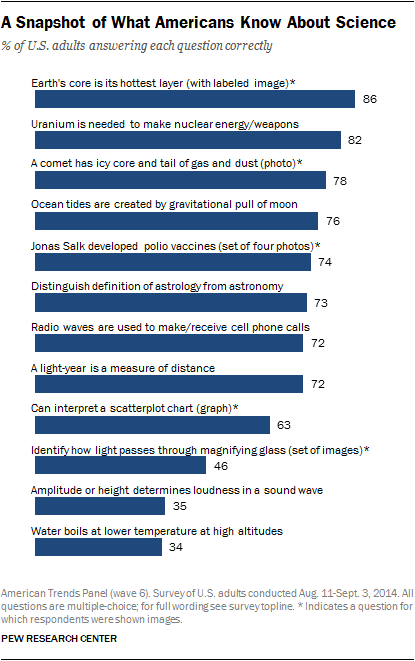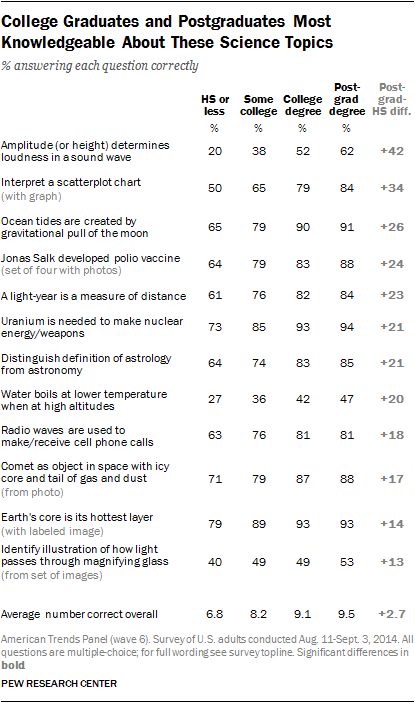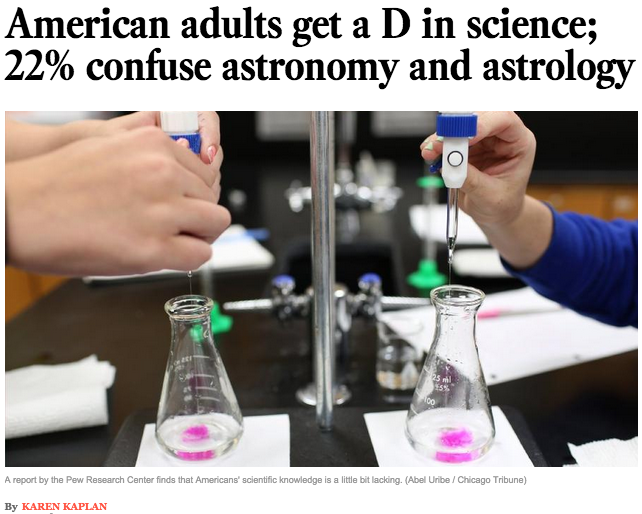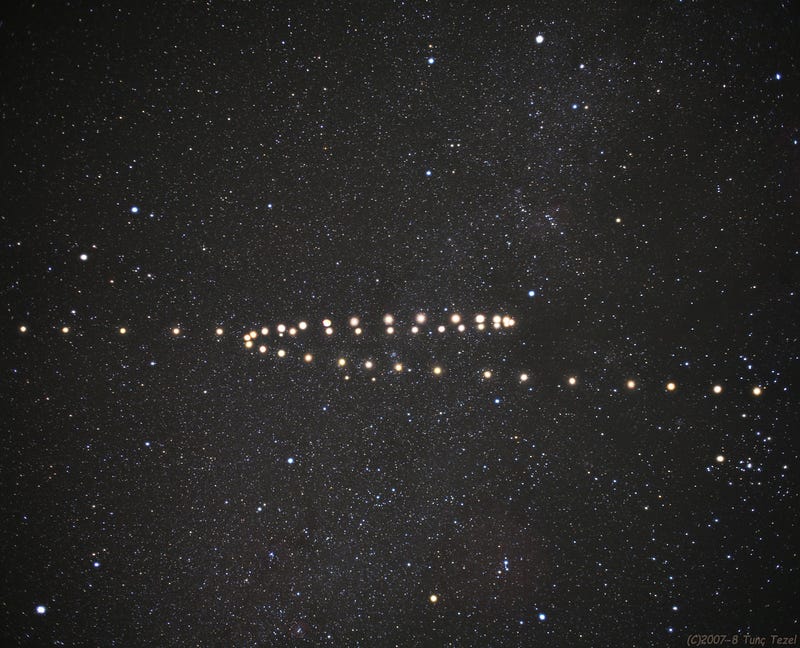Weekend Diversion: Mockery Gets You Nowhere
If Americans get a “D” in science, what should the A-students do?
“It is worthwhile, too, to warn the teacher that undue severity in correcting faults is liable at times to discourage a pupil’s mind from effort.” –Quintilian
It’s pretty easy, in the culture we live in today, to feel like everything is either “people on my side” or “people against me” when it comes to practically every issue. Yet that’s not truly the reality of anyone’s life. As Tower of Power sang some 40 years ago, nearly all of us, particularly under the right circumstances, are Willing To Learn.
But earlier this week, a study came out by the Pew Research Center that asked a sample of some 3,000+ American adults twelve questions about their science knowledge. Out of the twelve questions, the average score was 7.9 correct. That’s something that happened.
But what does it mean? That depends on whom you ask.


One could look at this study and note the difference that education makes in general knowledge of science questions. One could look at this and wonder why the sound wave loudness/amplitude or water boiling temperature/pressure relations are so difficult for most people. Or one could look at the fact that one out of three test-takers got no more than two questions wrong as an extraordinary achievement, depending on your perspective.
But what I most commonly saw was something that I consider disgusting, which many — including the LA Times — have no problem doing: punching down.

Earlier this week, I had the opportunity to participate in Huffington Post’s Nerds Forum, which I did, and not for the first time. Normally, we cover about five-to-eight science stories, with the host calling on various participants to chime in on their take on the various stories. Generally, this is a pretty good recap of some of the week’s biggest science stories, at least, according to some.
But this time, starting at 21:22, the host (Josh Zepps) and I really got into it.
http://live.huffingtonpost.com/r/segment/nerds-forum/55f2d9d22b8c2ae92e0002b4
Josh Zepps: Americans, as it turns out, are just terrible at science. A new report from the Pew Research Center quizzed a few thousand adults on the basics of geology, physics and astronomy, and the average score… was a “D.” Americans with a graduate degree did better than those who didn’t make it […] And more than one in five test-takers was pretty sure that astronomy was actually astrology. [Laughter off-camera.] Somewhere, Bill Nye just got the heebie-jeebies.
Ethan, did you see what kind of questions they were asked? How dumb are we talking?
Ethan Siegel: You know, I think that’s really an offensive way to put this. You know, whenever you ask these general knowledge questions, it’s easy to look at the results and say, “of course, I know the difference between astronomy, the study of the stars, and the heavens, and all the celestial bodies, and astrology, which is, can we use where this star was when I was born to predict what my future’s going to be?” A lot of times, when you get the results, it’s not as cut-and-dry as the questions that were actually asked. A lot of times, the questions are actually a little more confusing. A lot of times, the questions are asked over the phone. A lot of times, there are good reasons why it’s very hard to do very well on an otherwise easy test. […] This comes out all the time. Every few years they do a study, and you’ll get a stat back like, “one in five people think astronomy is astrology,” “one in four people thinks the Sun goes around the Earth.” I think what this means is our idea of what scientific literacy is, that there should be some litmus test for, “if you know this then you’re smart and if you don’t know this then you’re an idiot,” that’s terrible! […] We shouldn’t be playing this game of “gotcha” with, “oh my God, let’s make fun of these people because they don’t know this general knowledge question.” So actually, I read something like this and I’m pretty annoyed that it’s happening at all.
Josh Zepps: Appreciating the majesty of science is also great, but I’ll guarantee that there’s a correlation between people who don’t appreciate the majesty of science and people who don’t understand what astrology and astronomy is. Like I don’t have any problem… you sort of remind me of the parents of little league teams who just want to give a trophy to everybody and want to pretend that there’s no difference between excelling and failing.
Ethan Siegel: Well, I mean, you can look at that however you like: I’m not going to tell you how to feel. But I am gonna tell you, I think if you play this game of “gotcha” to make yourself feel smarter because you’re laughing at someone else who you think is dumb, that’s… I don’t want any part of that.

For those of you wondering, the astronomy/astrology question — like all questions on this survey — was multiple choice, and the question itself was to select the correct definition of the idea of: “the study of how the positions of stars and planets can influence human behavior.” The correct answer was astrology, of course, but 22% of respondents selected “astronomy,” and that was why the answer was wrong.
But does being able to answer that question — or any question like that — correctly have anything to do with “how dumb are we talking” when it comes to people?


I really resent this idea: that the amount of knowledge someone has on a particular topic, the number of definitions they can rattle off, the facts they have memorized or how many “correct answers” they can give has very much to do with someone’s intelligence or even with their level of scientific literacy.
Give me someone who’s willing to learn, who shows themselves capable of solving problems, who’ll put in the time and effort to struggle with it, and who can both be aware of the process of science and appreciate its value to society, and I’ll take that over someone who “gives more right answers” but doesn’t want to both share their knowledge and continue learning any day.

When it comes to making our society better — to creating the world we want to live in — it’s up to us to ask ourselves how we hope to create it, and to live consistently with that. If you find yourself in a position where you’re the one who’s more knowledgeable, more capable, or more informed on a topic, don’t keep that understanding to yourself, and definitely don’t lord it over others. The way you make the world better is to share not only what you know but your love of knowing it with everyone else. Science, like all forms of knowledge, is for everyone. The more we all know, the more common ground we’ll find we all share.
Missed the best of our comments of the past week? Check them out here!
Leave your comments at our forum, and support Starts With A Bang on Patreon!





